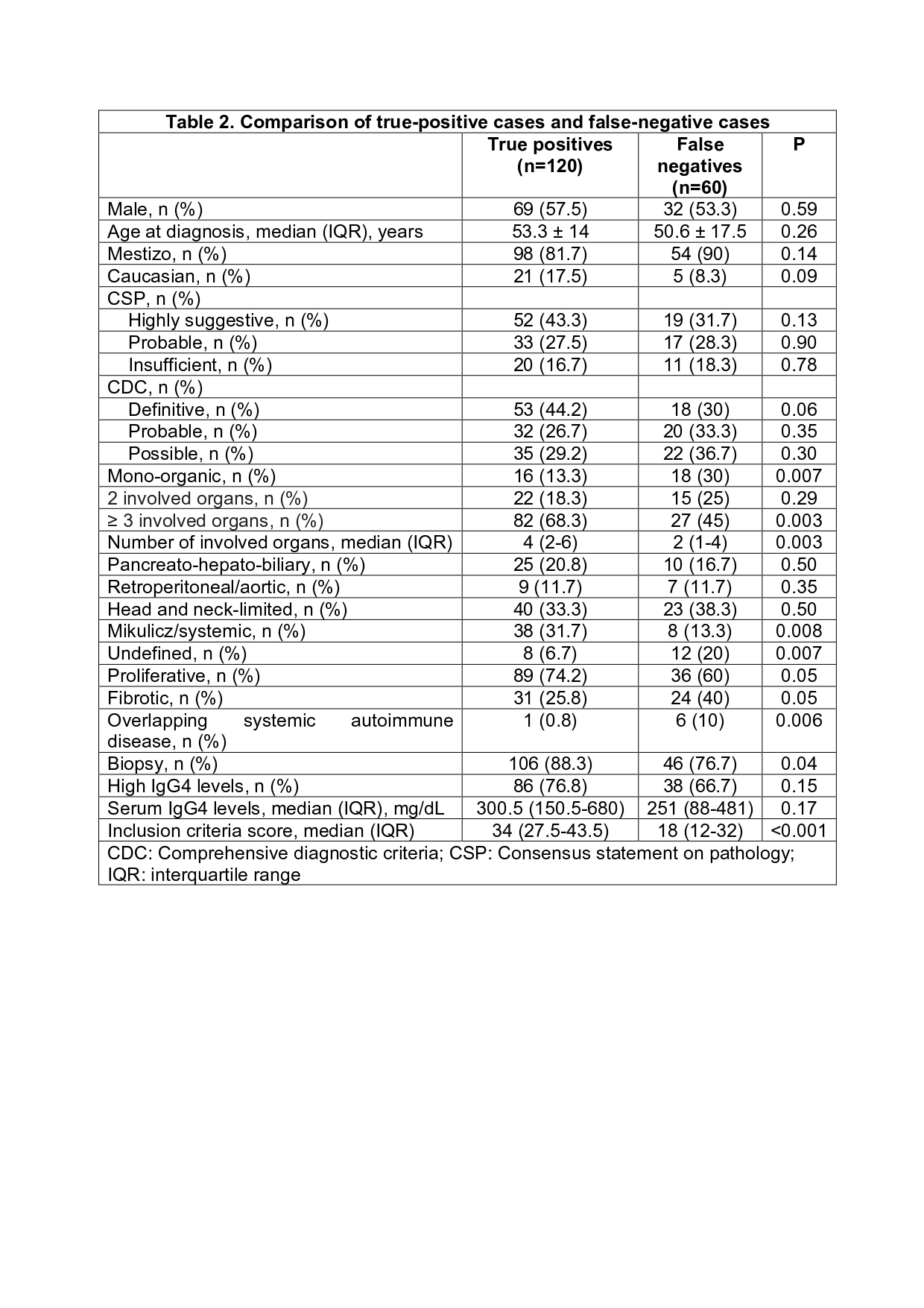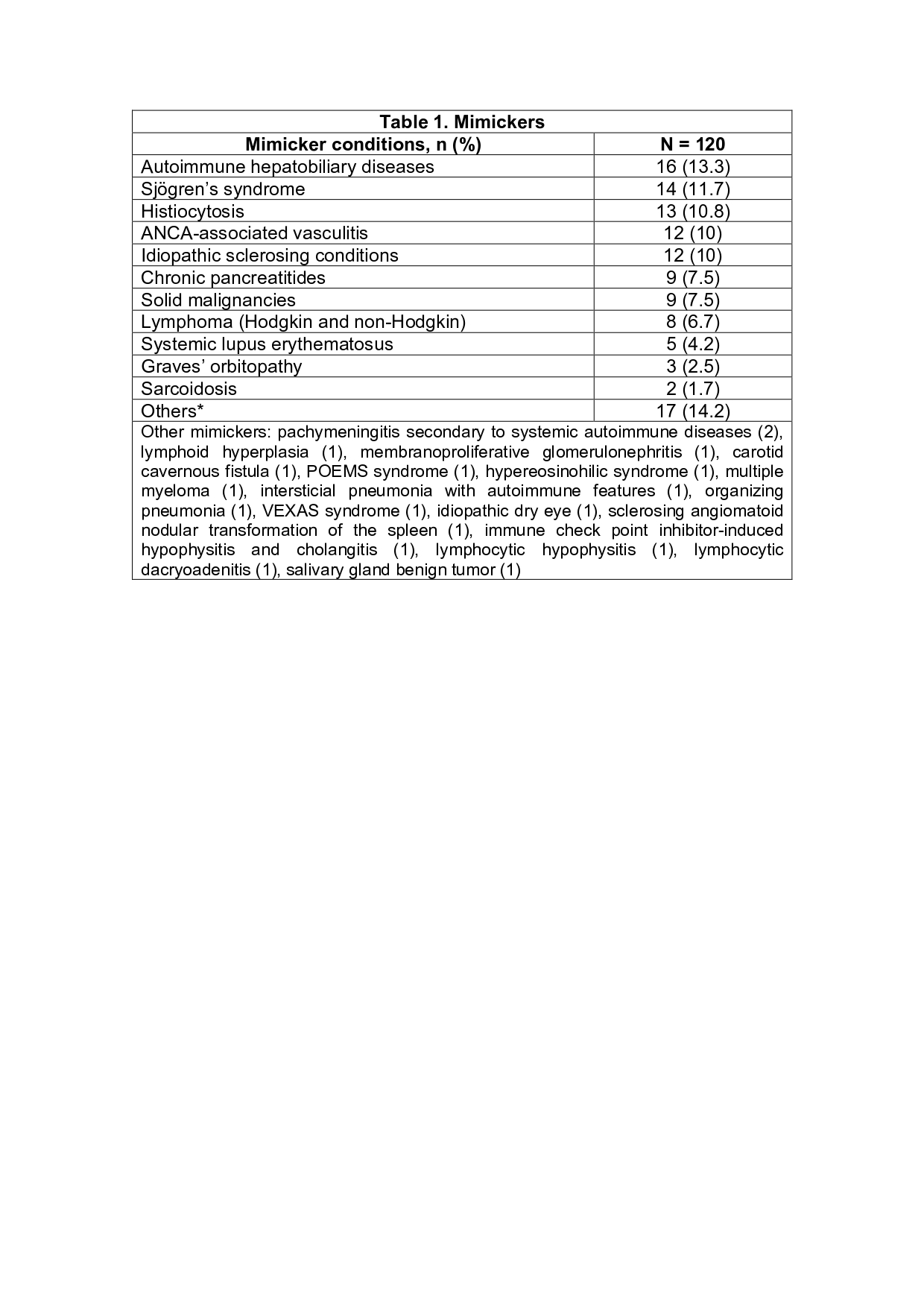Session Information
Date: Monday, November 8, 2021
Session Type: Poster Session C
Session Time: 8:30AM-10:30AM
Background/Purpose: The 2019 ACR/EULAR classification criteria (2019 AECC) for IgG4-related disease (IgG4-RD) have been validated in cohorts mainly composed of Caucasian and Asian patients. Its performance in Latin American patients is not known. We aimed to explore the performance of the 2019 AECC for IgG4-RD in a real-world cohort of Latin American patients.
Methods: We performed a retrospective multicenter study. Participating centers belonged to the Latin American Group for the study of IgG4-RD from Argentina, Chile, Mexico, Peru and Uruguay. Investigators were asked to submit information about patients and mimickers in a standardized fashion. IgG4-RD patients had to fulfill the Comprehensive Diagnostic Criteria for IgG4-RD and/or the Consensus Statement on Pathology. Mimickers were those diseases with overlapping features with IgG4-RD that were evaluated by the investigators. We retrospectively applied the 2019 AECC.
Results: We included 300 patients of which 153 (51%) were male. Mean age was 52 ± 15.3 years. One hundred and eighty (60%) had IgG4-RD and 120 (40%) a mimicker condition. The diagnoses of the mimickers are shown in Table 1.
After applying the 2019 AECC, 180 patients were classified as IgG4-RD (66.7%). Of the 60 false-negative cases (33.3%), 13 did not fulfill the entry criteria; of the remaining 47, 23 fulfilled one exclusion criteria; the remaining 24 did not achieve sufficient inclusion criteria scores.
Fourteen out of the 23 patients fulfilling exclusion criteria were positive for a disease-specific autoantibody, 6 of whom have overlapping autoimmune diseases (2 ANCA-associated vasculitis, 2 systemic sclerosis, 2 rheumatoid arthritis). The other 8 patients had no evidence of another autoimmune disease during follow-up; all of them had multiorgan involvement (median: 6 organs).
The true-positive cases had more involved organs and more frequently an available biopsy and were more likely to be of the Mikulicz/systemic and the proliferative phenotypes (Table 2).
Of the 120 mimickers, 20 (16.7%) did not fulfill the entry criteria, 71 (59.2%) fulfilled at least one exclusion criteria, and the remaining 29 (24.1%) did not achieved a score of 20, resulting in no mimickers fulfilling the 2019 AECC. Four mimickers achieved sufficient inclusion criteria scores (Rosai-Dorfman disease, systemic lupus erythematosus, sarcoidosis, and pancreatic cancer).
The performance of the criteria was: sensitivity 66.7%, specificity: 100%, PPV 100%, NPV 66.7%. In a sensitivity analyses where all exclusion criteria were removed the sensitivity increased to 77.8% and the specificity decreased to 96.6%. When only removing the disease-specific autoantibody items, the sensitivity was 73.3% and the specificity 100%.
Conclusion: Application of the 2019 ACR/EULAR classification criteria for IgG4-RD in a real-world Latin American population confirms its high specificity in excluding those without the disease. The sensitivity was lower than the one reported in other cohorts. The presence of concomitant autoimmune diseases and clinically not significant disease-specific autoantibodies excludes a significant number of patients from fulfilling the criteria.
 Table 2. Comparison of true-positive cases and false-negative cases
Table 2. Comparison of true-positive cases and false-negative cases
To cite this abstract in AMA style:
Martin-Nares E, Hernandez-Molina G, Baenas D, Delgado-de la Mora J, Caeiro F, Wurmann Kiblisky P, Pimentel-Quiroz V, Ascuña Valdivia V, Faz-Muñoz D, Saad E, Cairoli E, Elgueta Pinochet S, Madariaga Charaja H, Montante-Montes de Oca D, Gallo J, Ugarte-Gil M, Neira O, Burgos P, Paira S. Validation of the 2019 American College of Rheumatology/European League Against Rheumatism Classification Criteria for IgG4-Related Disease in a Latin American Cohort [abstract]. Arthritis Rheumatol. 2021; 73 (suppl 9). https://acrabstracts.org/abstract/validation-of-the-2019-american-college-of-rheumatology-european-league-against-rheumatism-classification-criteria-for-igg4-related-disease-in-a-latin-american-cohort/. Accessed .« Back to ACR Convergence 2021
ACR Meeting Abstracts - https://acrabstracts.org/abstract/validation-of-the-2019-american-college-of-rheumatology-european-league-against-rheumatism-classification-criteria-for-igg4-related-disease-in-a-latin-american-cohort/

